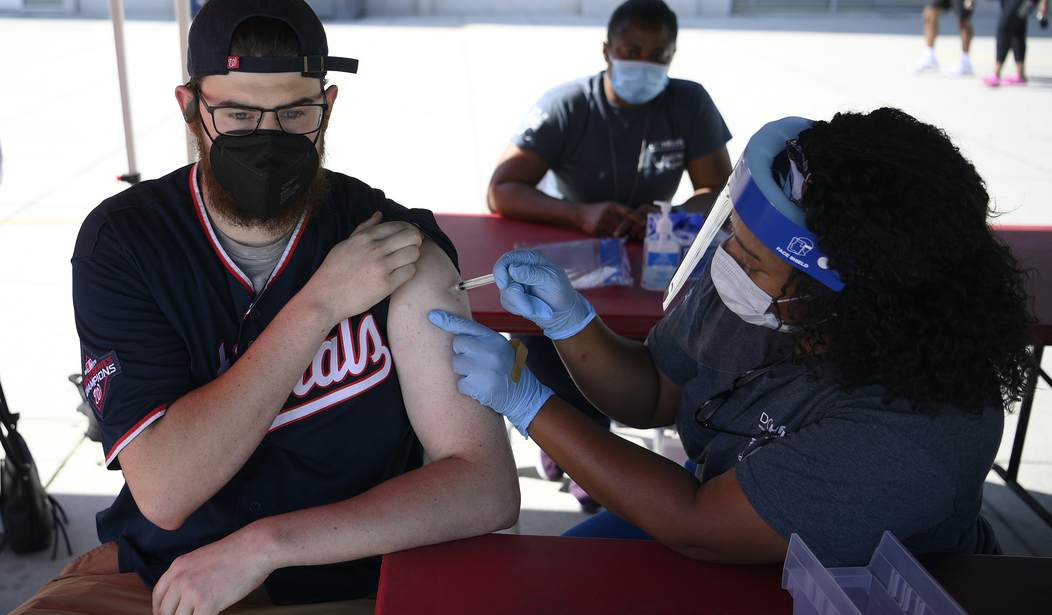Or would this be a third look? The beleaguered Johnson & Johnson/Janssen vaccine against COVID-19 has taken a beating from American regulators, but new data suggests that it may hold up as well or perhaps better than its competitors. A study conducted in South Africa during its Omicron tsunami shows that two shots of J&J’s vaccine provided 84% effectiveness against hospitalization and serious illness, including but not limited to the Omicron variant:
A booster dose of Johnson & Johnson Inc’s (JNJ.N) single-dose COVID-19 vaccine was 84% effective at preventing hospitalization in South African healthcare workers who became infected as the Omicron variant spread, researchers said on Thursday.
The real-world study, which has not been peer-reviewed, was based on a second dose of the J&J vaccine administered to 69,092 workers between Nov. 15 and Dec. 20.
An initial course of inoculation has been shown to offer only greatly reduced protection against infection by Omicron, which is spreading quickly through many countries after first being identified in late November in southern Africa and Hong Kong.
The New York Times found this result “somewhat surprising” on the basis of antibody studies, This points to a long-standing problem with vaccine studies more than any surprise from the results:
Those results prompted South Africa to launch a trial in November among health care workers who had already received one dose of the vaccine between six and nine months earlier. When the Omicron variant began surging across South Africa in late November, the researchers running the trial began tracking how boosted health care workers fared against the variant, finding that it worked well.
This result was somewhat surprising, given that antibodies taken from people who had received one dose of the vaccine failed to block Omicron from infecting cells in laboratory experiments.
It’s possible that the booster shots raised antibodies to protective levels. And while antibodies help the body fend off infections, they are just one of many parts of the immune system.
Indeed, and that apparently is where the J&J/Janssen shot has a significant and perhaps decisive advantage. CNN reported on a separate study that showed using J&J as a booster to mRNA recipients also turned out to be more effective than a third mRNA shot, at least in lab results. Rather than measure the antibody response, however, this study in Boston looked farther and saw a clear advantage for the J&J shot:
Separately, Dr. Dan Barouch and colleagues at the Beth Israel Deaconess Medical Center in Boston looked at blood taken from 65 vaccinated volunteers and tested it against the Omicron variant. They looked at both antibodies — the first line of defense against infection — and T-cells.
Using the J&J vaccine as a booster for people who originally got two doses of Pfizer/BioNTech’s vaccine generated a 41-fold increase in neutralizing antibodies and a five-fold increase in the CD8 killer T cells that destroy cells infected by the virus. That stops the virus from replicating and spreading. Boosting with the Pfizer vaccine generated a 17-fold increase in neutralizing antibodies and a 1.4-fold increase in CD8 T-cells four weeks later, they found. …
Barouch said many studies look only at antibodies, which can stop the virus from infecting cells at all. He said the T-cell response, which is trickier to measure, is important in providing long-term protection from severe disease.
“There’s confusion — not just in the media and the public but also among doctors and scientists — that only neutralizing antibodies equate with protection, and that’s just not true,” he said. “What we are seeing with 70% protection with Pfizer and now 85% protection with J&J — which is occurring at very low levels of neutralizing antibodies — strongly suggests T-cell responses are important in the protection that we are seeing.”
This is not the first time that studies involving the J&J shot suggested that focus on antibody protection might miss the point. The two mRNA vaccines (Pfizer and Moderna) showed a significant decline in effectiveness several months after the first round of shots, where no such decline had been evident from a single J&J shot over the same period. Researchers suspected that the J&J vaccine might be producing a more robust T- and memory-B-cell response than the mRNA vaccines. This new study suggests that J&J succeeds at building long-term defenses better than the mRNA vaccines do on their own.
This might make the J&J vaccine a smarter choice for boosters going forward, but it’s a bit late for that revelation. The FDA and CDC have again discouraged people from using the J&J vaccine thanks to rare side effects, similar to the circumstances which caused the two agencies to briefly suspend use of the vaccine. Even if they reverse that recommendation, they have effectively killed the demand for J&J and its value as a public health choice. Too bad.








Join the conversation as a VIP Member